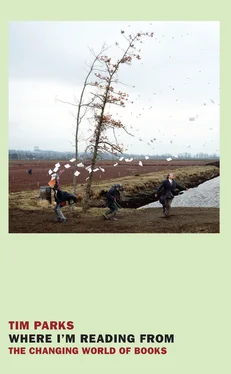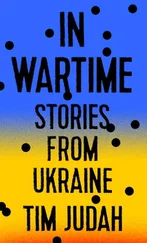But my own case is, I think, more curious, and I would be eager to hear of other writers in the same position, or rather many positions. Inevitably, as one addresses different communities of readers in different countries one tends to write differently for them, not necessarily to please, but just to be in meaningful relation to them. In fact if I want to displease them, I have to be very aware of their likes and dislikes. I don’t do this with cynical calculation. It simply happens, like an adjustment to the weather, or the language you are speaking, or your new girlfriend’s parents; and you discover you are a different writer, a different person almost, when engaging in different projects. This can be quite liberating and certainly more fun than the writer who feels trapped in a small world. You realize you are many writers, potentially very many, and the way your talents develop will depend on the way different communities in different countries respond to you.
This reality is in sharp contrast with the rhetoric that surrounds creative writing today. If asked, most writers will say they write only for themselves and are not aware of, let alone swayed by an audience. An ideal notion of globalization, then, posits this sovereign individual, who enjoys a consistent and absolute identity, above any contamination from those who buy his work, selling the product of his or her genius to a world that is able to receive it and enjoy it in the same way everywhere. So individualism and globalization go hand in glove. The idea that we are absolutely free of any community permits us to engage with all people everywhere. This is why so much international literature is about freedom and favors rebellions against institutions.
But the experience of the writer addressing multiple separate audiences—or perhaps using pseudonyms for certain kinds of writing in contrast with the work published under his or her own name—belies this myth. Indeed, as the years go by, I begin to suspect that it is precisely in positing themselves as independent from and uninfluenced by the collective, that writers are in fact agreeing to fill a part that the modern community of would-be individuals has dreamt up for them: the one who allows us all to believe that freedom and absolute identity outside the community are possible.
I’M ENGLISH AND live in Italy. During March 2011, within two or three days of each other, I received: from The New York Review of Books , four novels by the Swiss author Peter Stamm; from the Italian newspaper Il Sole 24 Ore , Jonathan Franzen’s Freedom , in English and Italian; and from a New York publisher, a first novel, Funeral for a Dog , by the young German writer Thomas Pletzinger. The last was accompanied by some promotional puff that began: “Pletzinger is German, but you wouldn’t know it from his debut, which is both wise and worldly.”
What a wonderful insight this careless moment of blurb-talk gives us into the contemporary American mindset! We want something worldly, but if it seems too German, or perhaps just too foreign, we become wary. As my mailbag indicates, the literary community is very much an international phenomenon, but not, it would seem, a level playing field. To make it in America, Pletzinger must shed his German-ness as if he were an immigrant with an embarrassing accent.
Peter Stamm, whose novels I eventually reviewed, rises to this challenge with great ingenuity. He writes in the leanest prose imaginable, telling stories about phobic characters in love with routine, in need of protection, but simultaneously anxious that life might be passing them by; they yearn for life and are afraid of it, and the more they yearn, the more they are afraid. Stamm’s genius is to align his spare prose with the psychology of people who fear richness and density; that way he creates a style that’s both “literary” and absolutely translatable:
Andreas loved the empty mornings when he would stand by the window with a cup of coffee in one hand and a cigarette in the other, and stare down at the small, tidy courtyard, and think about nothing except what was there in front of him: a small rectangular bed in the middle of the courtyard, planted with ivy with a tree in it, that put out a few thin branches, pruned to fit the small space that was available.
If you didn’t know Stamm was Swiss, nothing in the English translation would betray this blemish. Certainly he never tells you anything about Switzerland, or the other countries where his books are set. Whenever one of his main characters is asked, while abroad, about his or her home country, the wry Stamm has them shrug and answer that they don’t really have anything to say.
Franzen is the opposite; he could hardly be more loudly American, and to come to him right after Stamm is to see how different are the roads to celebrity for the Swiss author and the American. While Stamm’s characters come free, or bereft, of any social or political context, Franzen’s often seem barely distinguishable from a dense background cluttered with product names, detailed history and geography, linguistic tics, dress habits, and so on, all described with a mixture of irony and disdain, an assumption of superiority and distance, that I immediately find myself uncomfortable with.
Lists abound in Freedom : to describe the meanness of the grandparents of Patty, the protagonist, we are given a list of the “insulting gifts” they bring at Christmas:
Joyce famously one year received two much used dish towels. Ray typically got one of those big art books from the Barnes & Noble bargain table, sometimes with a $3.99 sticker still on it. The kids got little pieces of plastic Asian-made crap: tiny travel alarm clocks that didn’t work, coin purses stamped with the name of a New Jersey insurance agency, frightening crude Chinese finger puppets, assorted swizzle sticks.
Every character trait, every room, every neighborhood, is good for a list, as if Franzen himself were eager to overwhelm us with gifts of dubious taste:
By summer’s end, Blake had nearly finished work on the great-room and was outfitting it with such Blakean gear as PlayStation, Foosball, a refrigerated beer keg, a large-screen TV, an air-hockey table, a stained-glass Vikings chandelier, and mechanized recliners.
Often it feels like the characters only exist as an alibi for what is really a journalistic and encyclopedic endeavor to list everything American. Where it’s not objects, it’s behavior patterns:
In the days after 9/11, everything suddenly seemed extremely stupid to Joey. It was stupid that a “Vigil of Concern” was held for no conceivable practical reason, it was stupid that people kept watching the same disaster footage over and over, it was stupid that the Chi Phi boys hung a banner of “support” from their house, it was stupid that the football game against Penn State was canceled, it was stupid that so many kids left Grounds to be with their families (and it was stupid that everybody at Virginia said “Grounds” instead of “campus”).
It’s interesting that in this passage the Italian translator has to leave words like football (as opposed to soccer), then Grounds , and campus , in English. This alerts us to a larger problem with translating Franzen; these are not just lists of American things and things American people do, but also—and crucially—of the very words Americans use. Foosball, or table football in British English, is called calcio balilla in Italian, Balilla being the nickname of a child hero who in 1746 started a revolution by throwing stones at Austrian soldiers. The translator rightly shies away from using a term that would shift the mind abruptly toward Italian culture, leaving the incomprehensible Foosball. Further on, Italian has neither the object nor the denomination “mechanized recliners,” so the translator is obliged to explain what it is (and the reader still won’t be able to picture this aberration in all its ugliness).
Читать дальше












